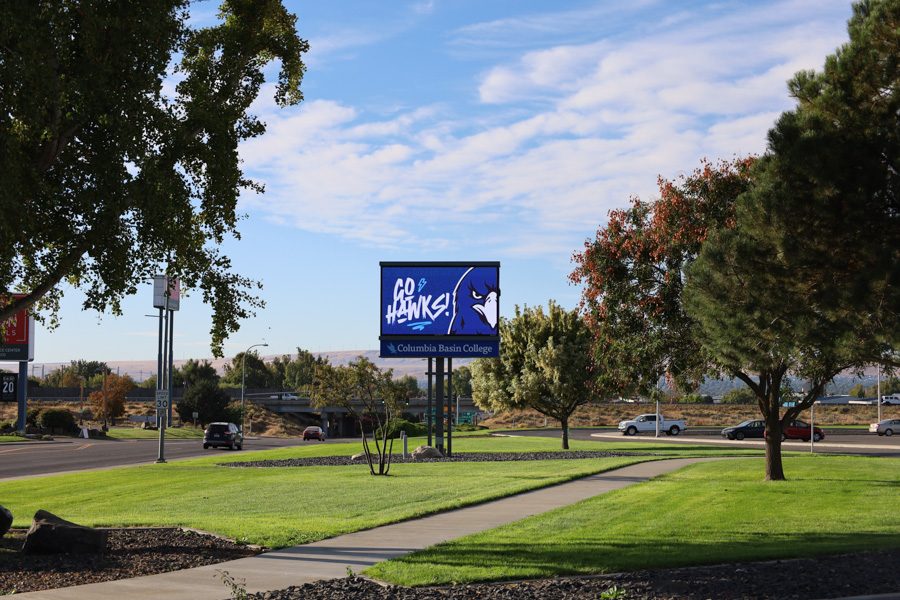
Home » Colleges complete several smaller-scale projects
Higher Education
Colleges complete several smaller-scale projects

Columbia Basin College in Pasco installed a new reader board on 20th Avenue.
Photo by Nathan FinkeOctober 14, 2024
Columbia Basin College is poised to build a new arts center, if it can get the state to approve the project.
Washington State University Tri-Cities officials are seeing more students on campus and recently completed $3.5 million in smaller-scale capital projects.
Here’s a look at what’s happening on their Tri-Cities campuses:
Columbia Basin College
Columbia Basin College has an operating budget of $69.1 million.
The school – which has 893 staff and faculty members – completed a few smaller projects in the past year, including a new 20th Avenue reader board, Hawk Union Building, or HUB, parking lot replacement and multiple mechanical upgrades around the campus.
And there are plenty of capital projects for the 2024-25 school year.
Projects planned include multiple roof re-coating projects, starting the design process for new student housing, annual road and parking lot maintenance, starting the design process for Saraceno Way updates and replacing the aging water and sewer lines on the Pasco campus.
CBC officials are hoping the State Board for Community and Technical Colleges will help fund a new Center for Arts and Innovation building.
“It’s pending funding through the state capital budget. If that passes, we will begin design July of 2025,” said Elizabeth Burtner, CBC’s assistant vice president for marketing and outreach.
In the state’s Capital Request for New Appropriations list for 2023-25, the $44 million performing arts building project is listed 16th on the state’s list of 48 priorities.
Burtner said the school is also waiting for capital funding from the state for the $49 million Center for Applied Science and Agriculture building, which is ranked 34th on the priority list.

Columbia Basin College said it soon will need a second student housing building since Sun Hawk Hall at 2901 N. 20th Ave. is at capacity.
| Photo by Nathan FinkeMeanwhile, the school has been remodeling the T Building on the Pasco campus.
“We recently completed a renovation that created La CASA, which is our version of an equity center,” Burtner said.
La CASA, located in the T Building, aims to increase engagement and provide support for Hispanic/Latino, low-income, and historically minoritized students regardless of ethnicity, culture, gender and intersectional identities. Its purpose is to foster a sense of belonging among all students. La CASA will serve as a learning space and provide deliberate programming.
Burtner said CBC is finishing the first phase of a three-phase project to renovate lab and classroom spaces in the T Building, which is scheduled for completion by March 30, 2025.
The need for a second student housing building on or near the campus is becoming important, as the first one, SunHawk Hall, is filled to capacity.
Burtner said that an architect has been selected, and CBC is currently in the design process.
“Construction is scheduled to be completed by August 2026,” she said.

Washington State University alumni, WSU Tri-Cities faculty, staff and community members wave WSU flags and welcome signs to welcome incoming students to campus on the first day of classes.
| Courtesy WSU Tri-CitiesWSU Tri-Cities
Washington State University Tri-Cities announced 3.3% growth in total fall enrollment in September 2024.
Much of this growth is attributed to first-year students.
“WSU Tri-Cities saw several improvements in student enrollment this year, including a 16% increase in new first-year students and a 2.2% increase in new transfer students,” said Damien J. Sinnott, vice chancellor of finance and administration at WSU Tri-Cities, in a news release. “These gains bolstered the campus’ total enrollment figures, which grew from 1,441 last fall to 1,489 this year. Overall undergraduate enrollment stands at 1,376, a 5.2% increase over fall 2023.”
Sandra Haynes, chancellor of WSU Tri-Cities, said the energy on campus is palpable.
“We are thrilled to see such a remarkable increase in total enrollment and especially first-year student enrollment this year,” Haynes said in a release. “It’s a testament to our connection to the community and the exceptional quality of education we offer. It is great to welcome so many new students who will bring fresh energy, ideas, and perspective to our institution.”
This year’s operating budget for the Richland campus is $29 million. The Tri-Cities campus employed 322 people in fall 2023. That translated to 283.9 full-time equivalent employees.
“Updated data will not be available until late October or early November, but I do not anticipate a significant change,” Sinnott told the Tri-Cities Area Journal of Business.

Washington State University Tri-Cities Institute for Northwest Energy Futures held an open house in early October 2024 at 2892 Pauling Ave. in Richland. INEF aims to coordinate and connect WSU energy efforts and partners to innovate systems-level clean energy and carbon-neutral solutions.
| Photo by Rachel VisickThe school held an open house and ribbon-cutting on Oct. 2 for the Institute for Northwest Energy Futures, a new research center on the Richland campus to address increasing demands for resilient, affordable and available low-carbon electricity and transportation fuels.
The center was listed in the state budget for WSU at $7.7 million.
Sinnott said that while capital projects are funded by the state on a biennium basis, funding for upcoming projects “is unknown at this time.”
But Sinnott also mentioned a number of smaller projects completed in the past year, which included:
- An upgrade to the school’s irrigation pump house screen to comply with new requirements designed to protect juvenile salmon.
- An upgrade to the chiller in the East Building, the oldest building on campus.
- Replacement of the chiller in the Consolidated Information Center, or CIC, building.
- Remodel and upgrades, including furniture and technology, for all general use classrooms in the Elson S. Floyd building.
- Bathroom repairs and upgrades in the East Building.
- Demolition and removal of two relocatable buildings that had outlived their useful lives.
- Renovation of the school’s engineering lab in the Floyd Building.
All told, Sinnott said, the renovation investment for all capital projects was $3.5 million.
Construction + Real Estate
KEYWORDS October 2024





